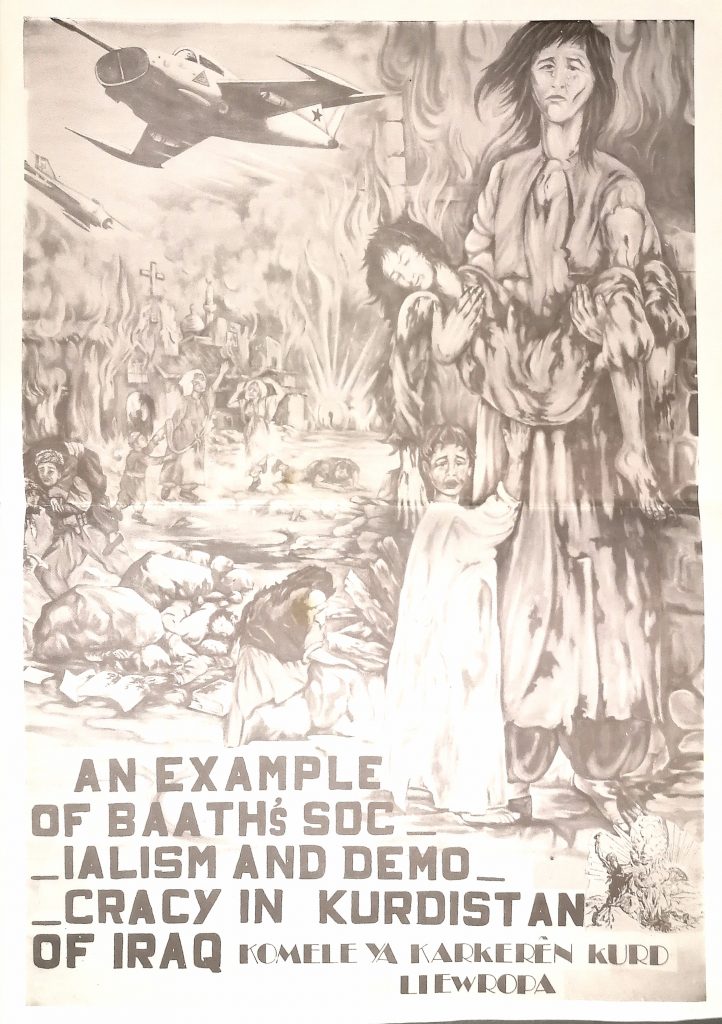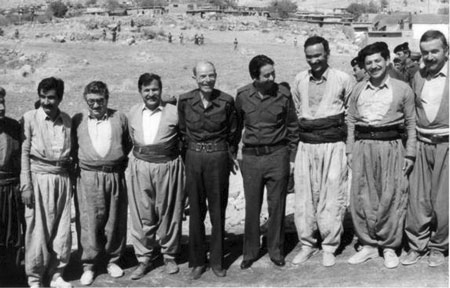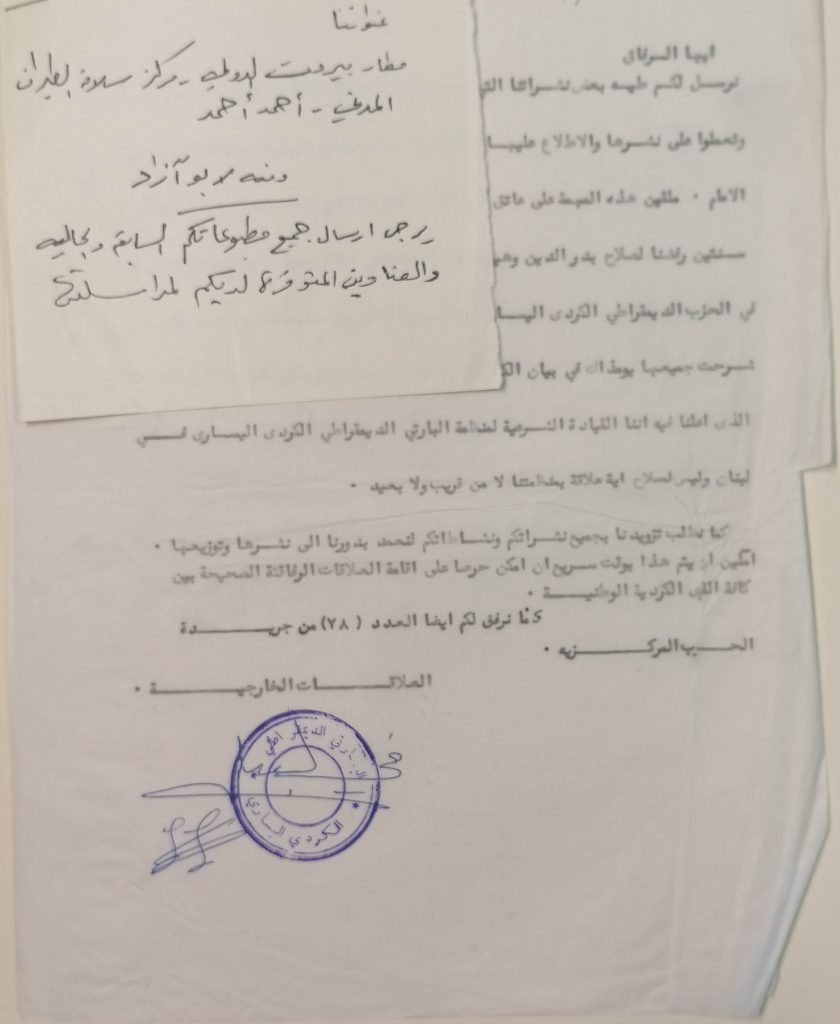Part 2: Omar Sheikhmous and the Patriotic Union of Kurdistan (PUK) 1975-2005
Although Mustafa Barzani had dominated the Kurdish movement since the late 1940s, there was by no means unqualified support for his leadership. Factionalism has been a constant thread throughout the history of Kurdish politics, and even when there was a strong consensus about the need to protect Kurdish rights and achieve a greater degree of autonomy, there were often strongly contrasting views about what the objectives, priorities and strategies should be for doing so. In contrast with the conservative tribal foundations of the KDP, there had long been a rival group, centred around Ibrahim Ahmed and his son-in-law Jalal Talabani, who had different ideas about what form the Kurdish resistance should take. Coming from an urban rather than a rural background, most of these men were academics with an interest in socialist theories and links to underground parties such as Komala, the Iraqi Communist Party, the Kurdish Workers’ League or the Kurdistan Socialist Movement.
The vacuum created by the collapse of the Kurdish uprising and the flight of Barzani and his followers provided the opportunity for this group to come together and establish a new Kurdish political party. The Patriotic Union of Kurdistan (PUK) was founded in June 1975 in the wake of three separate meetings in Beirut, Berlin and Damascus – from whence Jalal Talabani issued the PUK’s first formal document. (We have a copy of the PUK’s foundation document, in Talabani’s own handwriting, at EUL MS 403/3/1/1.)
There were seven founding members – Jalal Talabani, Fuad Masoum, Kamal Fuad, Nawshirwan Mustafa, Adil Murad, Abdulrazaq Faili – and Omar Sheikhmous, creator and donor of the remarkable archive from which these materials are taken. This would therefore be a good moment to provide some more information about Sheikhmous.
Omar Sheikhmous: a brief biographical sketch
He was born in the town of Amouda in north east Syria (western Kurdistan) on 7 February 1942, and after basic education in the village school, spent seven years at a private American college in Aleppo where he learnt English and began taking an active interest in politics. He then came to England, in 1962, where he studied for the next five years: firstly taking GCEs at Acton Technical College and then working for a Diploma in International Affairs (1964-1967) at the London Institute of World Affairs, part of the University of London. Having obtained his diploma, he then moved to Sweden to begin postgraduate studies at the University of Stockholm. We have a number of his early writings from this period, including drafts of his MA and PhD theses and a questionnaire on Kurdish nationalism that he used for interviews for his thesis. There are also academic seminar papers and essays written on Kurdish politics and other Middle Eastern topics.
Sheikhmous worked on his PhD from 1972 to 1978, but broke off from academic studies to take a more active role in the Kurdish resistance following his participation in the founding of the PUK. Along with his Swedish wife Agneta, whom he had married in 1974, he joined the peshmerga forces in Kurdistan; there are many photographs of him in uniform with fellow Kurdish fighters, including Jalal Talabani, Adel Murad and Fuad Masoum. Agneta Sheikhmous was the first foreign woman to join the peshmerga, and there are several presscuttings in the archive about Agneta and her contribution to the Kurdish struggle. The PUK were based in Nawzeng, in the mountains of south-eastern Iraqi Kurdistan, but they were driven out of here in 1983 and took up a new position in the Jafati valley.

A poster by a Kurdish artist showing attacks on Kurdish villages by Iraqi planes. EUL MS 403 Box 3/2/2
This was a period of bitter fighting between the PUK and the Iraqi forces, complicated by shifting alliances between other Kurdish groups (such as the KDP-I, the remnants of the KDP, Komala and local militia). Of particular interest are a series of private military bulletins issued by the PUK, including reports on battles, communiques from the PUK Military Bureau and a letter from Nawshirwan Mustafa to a PUK military commander. These cover the period from 1976 through to the late 1980s, and are mostly in Arabic (EUL MS 403/3/1/1-3).
Although the PUK and the Iraqi government were engaged in violent conflict for much of the 1980s, there was a short period when the two sides entered into negotiations to try and find a solution. These took place between 1983 and 1985, before being broken off. There are a series of documents, including an official statement by the PUK as to why the talks had ended, along with copies of photographs showing Jalal Talabani and other PUK figures meeting with senior Iraqi officials.

This photograph was likely taken in the early 1980s, either before or during the PUK’s negotiations with the Iraqi government. In the centre of the picture can be seen Jalal Talabani standing alongside two senior figures from Iraqi military intelligence: Izzat al-Douri on his left, and alongside him, Saddam Hussein’s cousin Ali Hassan Majid. Both would later oversee the use of chemical weapons in the genocidal Anfal campaign against the Kurds, for which Majid – known as ‘Chemical Ali’ – was hanged as a war criminal in 2010. (Photocopy of a photograph, EUL MS 403/3/1/3/1)
In addition to taking part in the PUK’s military activities, Sheikhmous was also in charge of the party’s ‘Foreign Relations Committee’ from 1975 to 1986 and there are various press releases and other correspondence items that he wrote during this time that provide fascinating insights into the Kurdish network in Europe, amongst other things. He returned to Sweden in the mid-1980s where he took an active role in working with, and for, Kurdish refugees in the country. A large section of the archive covers his correspondence with Swedish politicians, involvement in Kurdish cultural events, academic conferences and political activities that reveal the concerns and efforts of the Kurdish community in exile to support the Kurdish cause. As Christine Allison has noted in her chapter ‘The Shifting Borders of Conflict, Difference and Oppression: Kurdish Folklore Revisited’, Sweden became the centre for Kurdish cultural productions by the diasporic Kurdish community until the 1990s (Gareth Stansfield and Mohammed Shareef (eds), The Kurdish Question Revisited (2017) p.120.) The archive contains numerous examples of such cultural production, including material relating to poetry, dance, music and literature (EUL MS 403/4).
In addition to his involvement in the cultural activities of the Kurdish community in Sweden, Sheikhmous also returned to academic work, and from 1986 to 2000 worked at the Center for Research in International Migration and Ethnic Relations (CEIFO) in the University of Stockholm, as a researcher, lecturer and administrator. In both his academic and administrative work, he focused particularly on the human right issue, studying the experience of Kurdish migrants and refugees, as well as investigating the claims of genocidal campaigns against the Kurds in Iraq that were carried out under Saddam Hussein.
It should be understood that the aim of establishing Kurdistan as an independent nation-state has not been a dominant part of the Kurdish agenda for much of the period in question. Although there are many papers in the Sheikhmous archive arguing the need for varying degrees of autonomy or self-regulation, the most important concern has always been to secure basic human rights for the Kurdish people, including that of speaking and writing in Kurdish, using their own language to educate their children, preserving traditions and dress, and resisting attempts at forced Arabisation of their homelands. Tragically, the denial of these rights has often been accompanied by brutal forms of repression, particularly in Iraq under Saddam Hussein.
Due to the significance of such issues in the history of the Kurds, there is a distinct section within the Sheikhmous archive (EUL MS 403/8) dedicated to documenting matters relating to human rights. These include correspondence between Omar Sheikhmous, the PUK and the Red Cross and other humanitarian agencies during the 1970s and 1980s, appeals for medicine and aid for children, published reports by Amnesty International (to which Sheikmous has belonged since the early 1960s) and other charitable organisations, international humanitarian appeals, reports of atrocities, and records of the victims of the Anfal campaign (1986-89) and Halabja bombing (March 1988). [As a side note, there is also a section of published works in AWDU on the Kurdish Human Rights Project, including legal documentation and court proceedings, at KHRP 323.]
Sheikhmous continued his advocacy for Kurdish rights during the years (2001-2007) he spent in senior roles at the Kurdish Service of the US multimedia agency ‘Voice of America’ (VOA), providing an international platform to promote the cause of the Kurdish people and provide accurate information regarding human rights abuses and the political realities of life in Kurdistan. Sheikhmous’ work for VOA is represented in the archive by audio and video recordings, e-mail correspondence, interviews and other papers. (EUL MS 403/6.)

An undated letter to the PUK from the KDP in Syria. (EUL MS 403/3/2/1)
While Sheikhmous was devoting his energies to this work in Sweden, the PUK continued its fight in Iraq, alongside the KDP and – during the Iraq-Iran war – with Iranian support. Saddam Hussein’s invasion of Kuwait in August 1990 led in turn to Iraq’s invasion by US-led coalition forces during the Gulf War, and following Saddam’s defeat in March 1991, the Kurds took part in an uprising against what was regarded as a weakened regime. Although the Iraqi government launched a massive retaliation against the Kurdish and Shi’ite Arab rebels, the imposition of a no-fly zone by coalition forces provided some protection for the Kurds and the Kurdistan National Assembly was established in June 1992. The Assembly was a delicate balance between representatives of the PUK, led by Jalal Talabani, and Massoud Barzani’s KDP, but the power-sharing did not last: a bitter civil war broke out between the two parties in 1994 and continued intermittently until the signing of the Washington Agreement in 1998. Thousands died during the fighting. The archive contains numerous documents relating to this civil war, including correspondence from Jalal Talabani, internal PUK communications, PUK press releases, presscuttings and commentaries, as well as parliamentary papers recording the positions and activities of PUK members within the National Assembly.
The 1998 peace agreement led to greater collaboration between the PUK and KDP, with both parties supporting the coalition forces that invaded Iraq again during the 2003 Gulf War. Following the permanent collapse of Saddam Hussein’s government in 2003, a new Kurdish Regional Government was established in 2005, with Massoud Barzani elected its president while Jalal Talabani was elected President of Iraq, a position he held until 2014. Omar Sheikhmous acted as personal adviser to Talabani from 2007 to 2012 and the archive contains many papers relating to the autonomous government, including tourism pamphlets encouraging international visitors to return to Kurdistan.
The history of the PUK and the other Kurdish political groups is a complex one, of ever-shifting alliances and rivalries, schisms and reunions. The archive contains material relating to the Kurdistan Worker’s Party (PKK), founded by Abdullah Öcalan in the Kurdish village of Fis – about 50 miles from the city of Diyarbakır in Turkey – in 1978. Their violent guerilla activities did not appeal to all the Kurdish groups in Turkey, and in June 1988 eight non-PKK groups came together to form TEVGER ( from Tevgera Rizgariya Kurdistan, or Kurdistan Liberation Movement). The archive has the text of an address to Tevger in Florence in 1992, that seems to have been given by Sheikhmous himself (EUL MS 403/1/7). In 2009 PUK co-founder Nawshirwan Mustafa founded a breakaway party, known as Gorran (In Kurdish بزووتنەوەی گۆڕان or Movement for Change). The archive contains many letters written by Nawshirwan Mustafa to Sheikhmous, Jalal Talabani, Kemel Fuad, Ahmad Bamerni and PUK military commanders during the 1970s and 1980s, providing some fascinating insights into the evolution of Mustafa’s political views.
In the next in this series of blogposts, we will look at the significance of the Sheikhmous archive within the wider context of contemporary Kurdish studies.